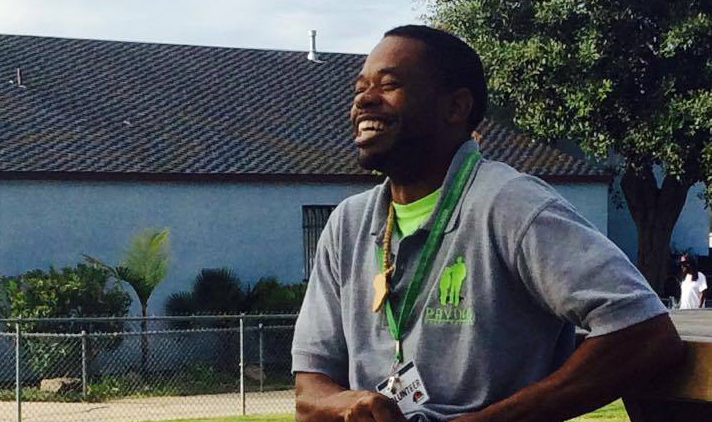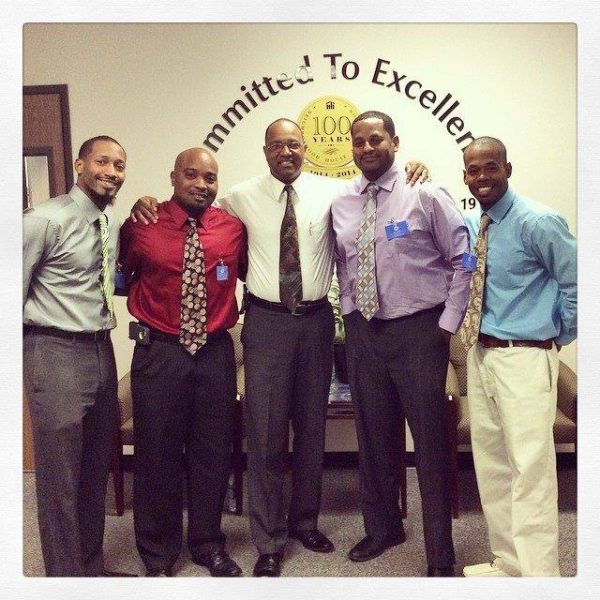
By Edward Henderson – Contributing Writer
Generational curses can haunt the minds of youth in Southeast San Diego more than any gory tale a Wes Craven horror film could ever conjure up. For many of these young souls, their life path is predetermined with pot holes of crime and crevices of self-doubt. Luckily our city is blessed with individuals who’ve traversed similar obstacles in life and returned poised to pave a great future for those in need of a second chance. Culinary artist Armand King, 34, is the founder of the aptly named non-profit ‘Paving Great Futures.’ Fueled by his experience in the streets, King serves as a shepherd to guide others out of the prison pipeline he knows well.
Raised in Restaurants
The seeds of discipline and responsibility were planted into King’s mind at a young age working at his father’s restaurant ‘Your Fish Connection.’ His days were spent peeling potatoes and helping with day to day operations.
“He taught me how to be independent and how to respect your own and be yourself. That was a repeated phrase,” said King.
The restaurant eventually moved to the corner of Euclid and Imperial where King was able to witness the growing culture of social awareness within the surrounding community.
“The area was a black political hub,” said King. “People came by and exchanged cultures and building blocks for community.”
Despite the positive foundation, King began to stray from the lessons he learned as he matriculated from adolescence into his teenage years. The turmoil surrounding his parent’s divorce, coupled with witnessing hypocritical behavior from individuals he once respected disillusioned the young man.
“I was getting all the right teachings from my parents … I saw a lot of people saying one thing and showing me something else. A lot of that had to do with me straying away.”
Clique Life
King began his affiliation with cliques at the age of 15. Popularized in San Diego in 1995, clique culture developed amongst youths as a pre-cursor to gang life. Young men would cut school, go to parties, dance, and encounter other cliques. Sometimes the altercations got violent. By the time young men in the cliques reached 18, the allure of gang life began to take hold.
“I was a tyrant as a youth,” said King. “Selling drugs, gang banging, pimping, that’s all we knew.”
Influence from gangster rap and the spoils associated with living the fast life fueled King’s passion for the path he had chosen. King’s perspective began to shift when Richard Wilson, one of his closest friends, was murdered during a senseless act of gang violence. Wilson was 21.
“When my brother died, I died,” said King. “Now I’m a tool to be used.”
King spent time in the Navy, however, after when he finished his tour, old habits caught up to him and ended up serving a 3 year prison sentence on conspiracy charges.
King’s Redemption
Upon his release, King was determined to finally build a life he could be proud of.
“Anybody that comes out of jail has a new energy and desire. It’s the perfect time to catch somebody and put them on the right route,” said King.
Basil Fontenot was the perfect individual to guide King once he returned home. Fontenot, a close friend of King, helped him find a place to live and provided a job at his restaurant ‘Snappers’ in the Market Creek Shopping Plaza. The culinary roots planted while peeling potatoes at his father’s restaurant began to bloom and provided a new passion. King would go on to cater events for the Del Mar Country Club, hosting high end clientele like Bill Gates and state politicians.
A coincidence shifted into destiny when King found out the old clique he was affiliated with as a youth had started up again. He took the opportunity to reach out to the kids and speak to them about new ways to make better choices.
“There was never an organization to show us a way out,” said King. “If somebody we respected showed us another way, we would have done it.”
The turn out from the event prompted King to use his experience in the streets and in the kitchen to create the organization he wished was around when he was younger.
Paving the Way
When you decide on a direction to take in life, the universe conspires to help it come to fruition. This fact was proven when King catered a speaking engagement for Rudolph A. Jonson, CEO of The Neighborhood House. King approached Johnson during the event and shared his vision to create a non-profit to assist the community. Johnson was inspired and took it upon himself to help.
“Anytime I find a young man who’s trying to give back and do something positive I’m going to do what I can to support that,” said Johnson. “A lot of times we launch before we’re ready. I wanted him to be ready and that was my goal.”
Johnson assisted with plans for the infrastructure, bi-laws, and operational plan for King’s organization.
Paving Great Futures launched in July of 2014. The organization’s mission is to provide the tools for people to transform their lives by fostering behavioral changes that promote responsibility for themselves and the surrounding community. This mission is accomplished through programs that provide entrepreneurial training, job readiness, job placement, life skills training, relapse prevention, and substance abuse counseling for adults and youth in need.
In the organization’s first year of action, 21 young men were placed in jobs with restaurants.
“We’re solution based. We know the problems, they’ve been there for years. If all of these intellectual minds and people put their focus on working the solution, we’ll alleviate the problem,” said King.
Paving Great Future’s next event is C.H.A.M.P (Culinary, Hospitality, Administration, Management, Program) October 13th. Youth will learn the ins and outs of the restaurant business and partake in a ‘knowledge of self’ seminar. Visit www.pavinggreatfutures.org to support and learn more about this purpose driven organization.



